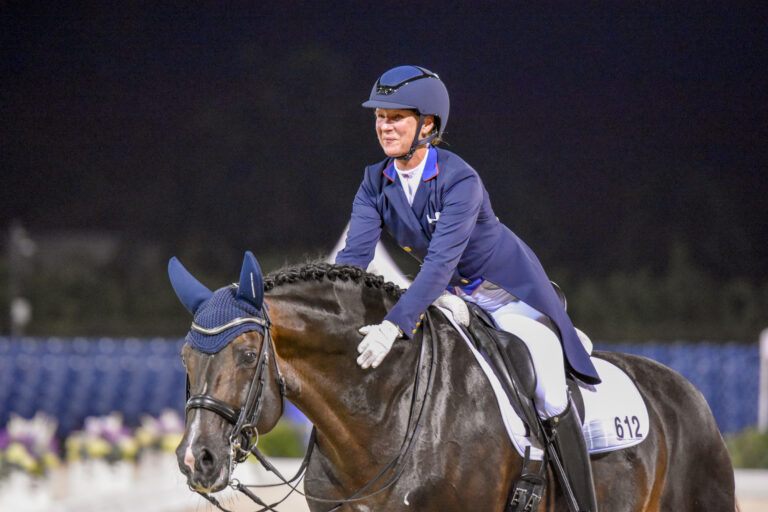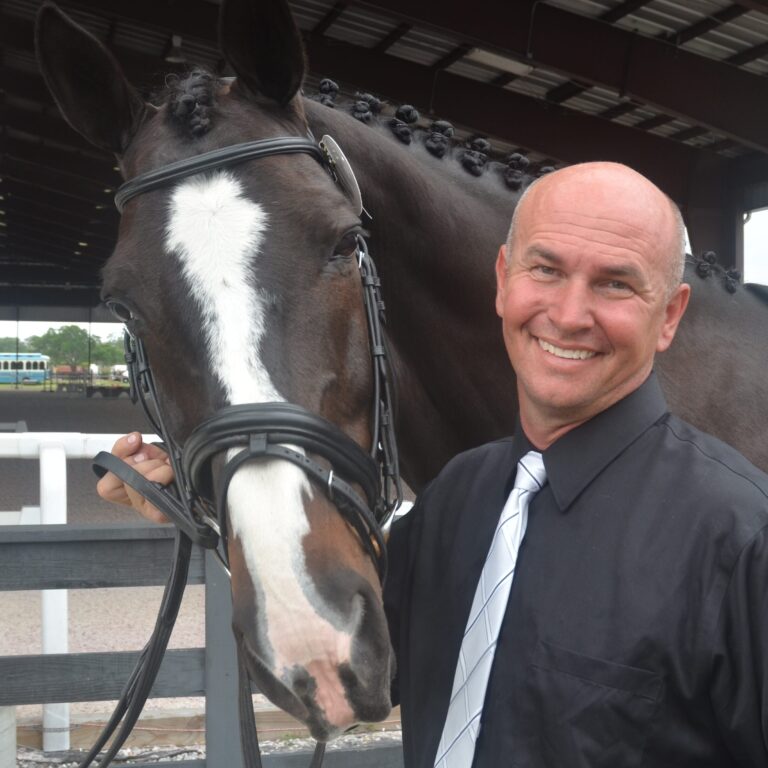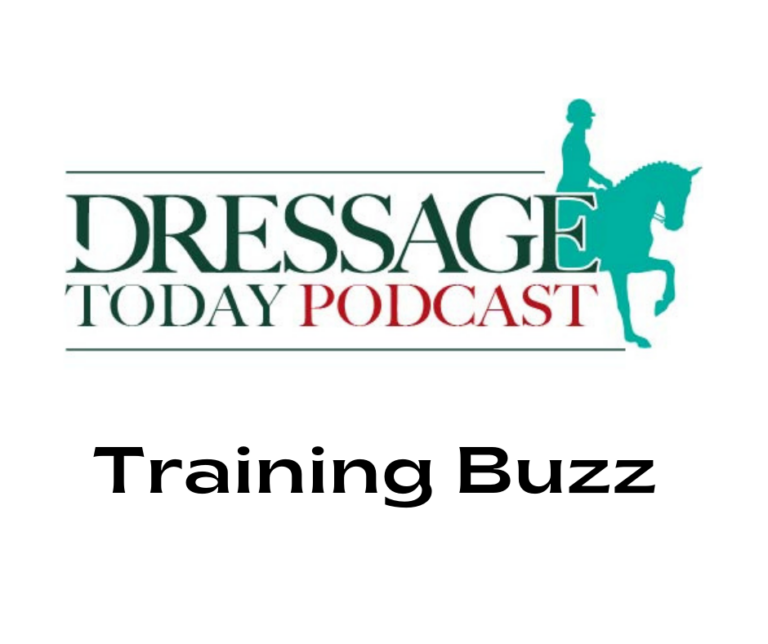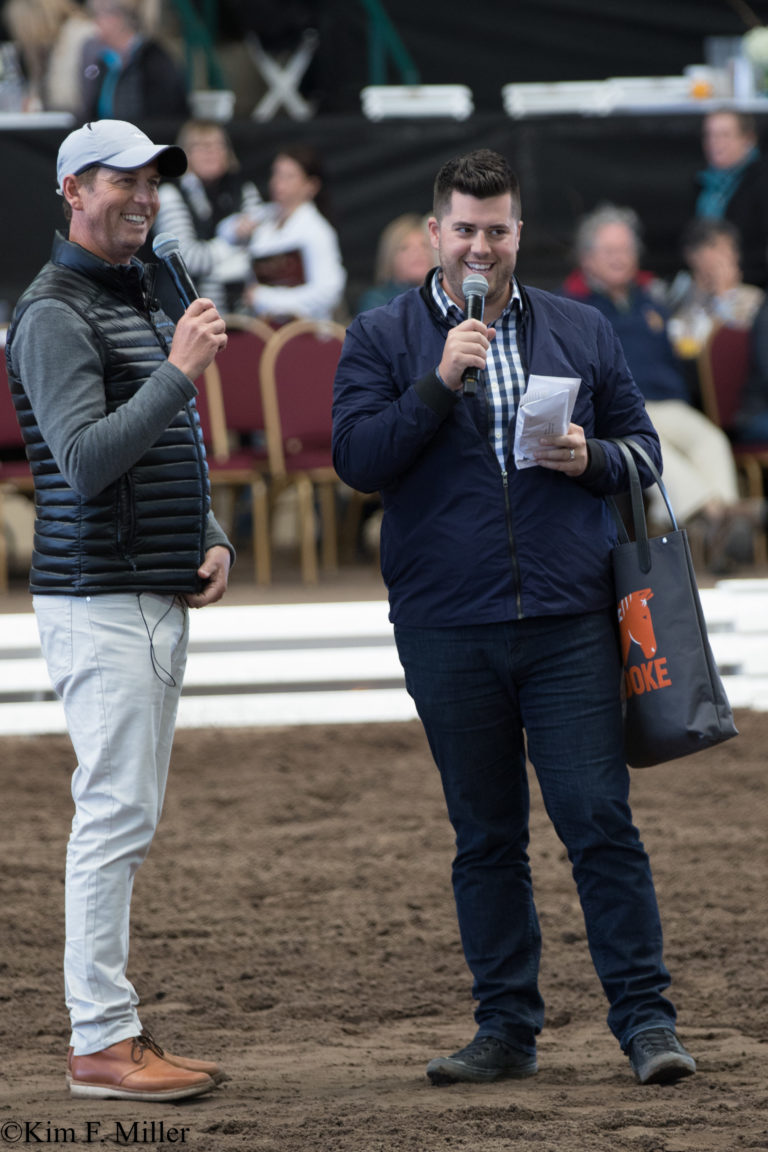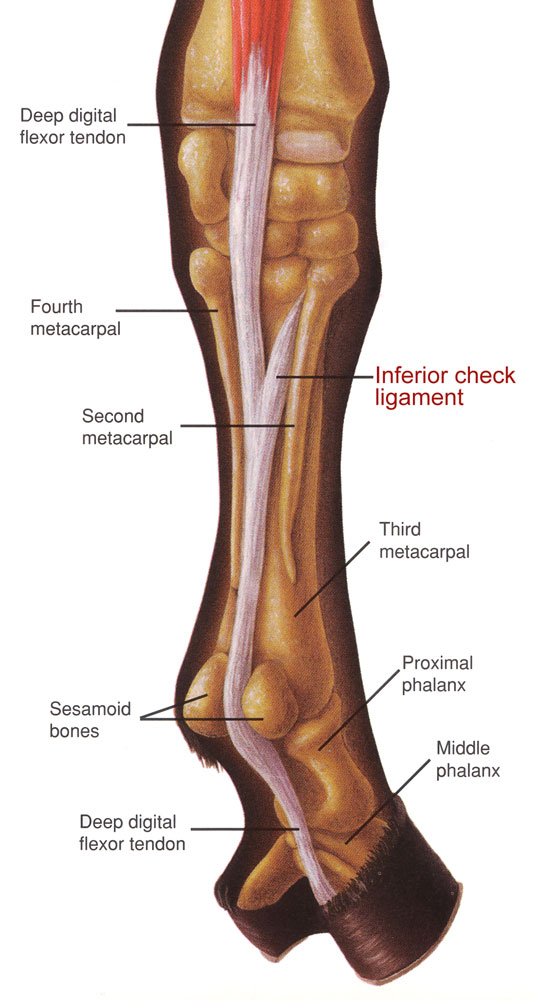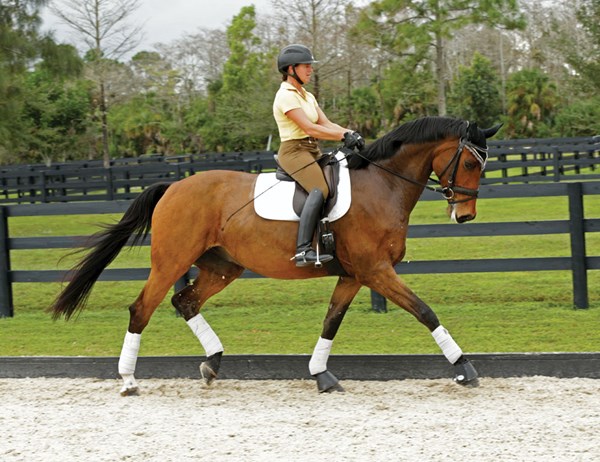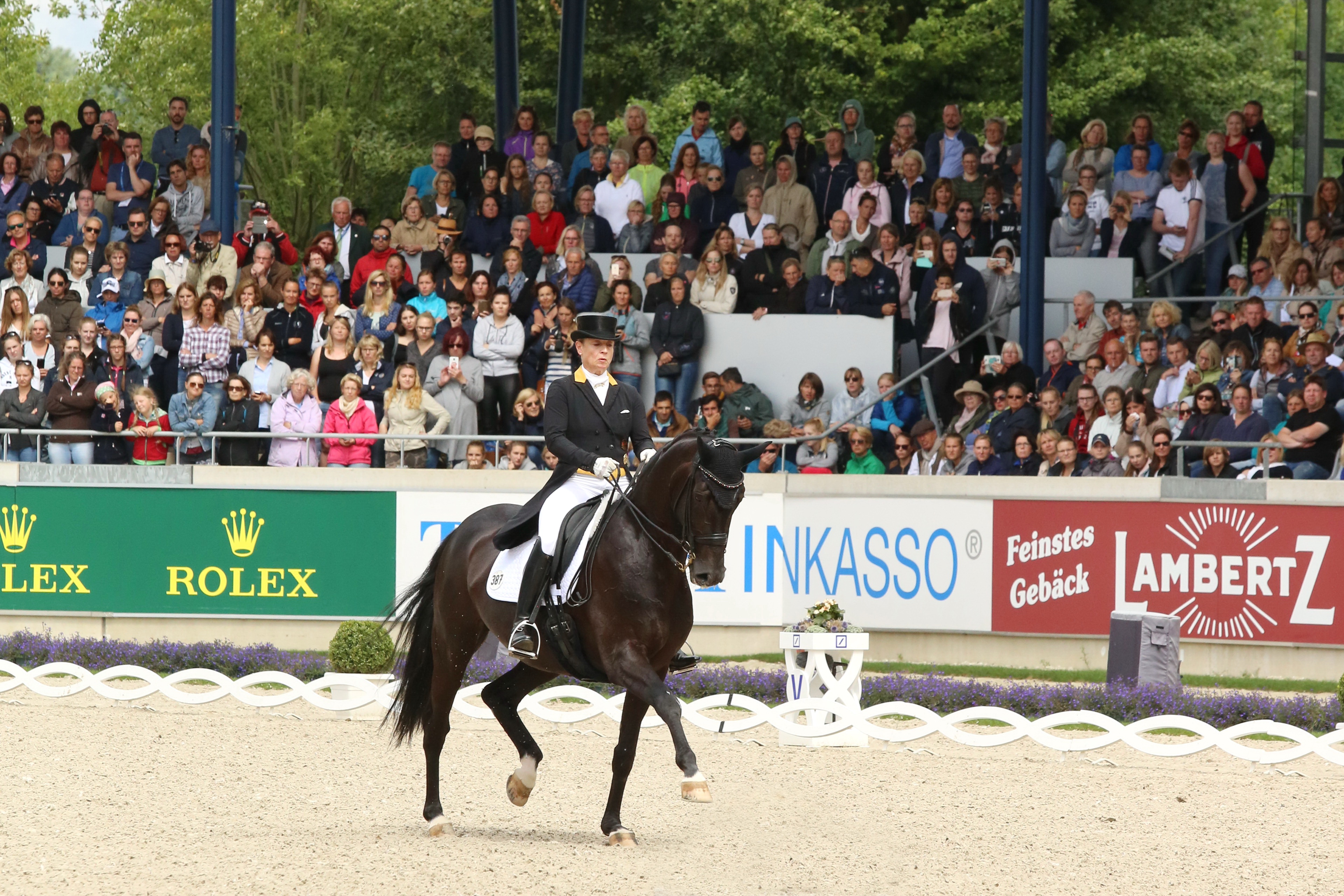
The Olympic and World Equestrian Games (WEG) may be major competitive goals for equestrians, but the CHIO Aachen in Germany is more than just a competition: It is arguably the epitome of equestrian sport as well as a celebration of the horse. Aachen is located on the western border of Germany near the Dutch and Belgian borders, and the CHIO starts in the middle of July. The 10-day “World Equestrian Festival” features the best of the best horses and riders from around the globe competing in multiple disciplines in front of a knowledgeable crowd. It is an experience unparalleled at any other venue. And while new and impressive centers for equestrian competition are developed worldwide, none are as steeped in the history of equestrian sport as the show grounds at the Soers in Aachen, where international competition has taken place since 1927.
I was last in Aachen in 2003, while the venue was gearing up for the 2006 World Equestrian Games. Since then, the stadiums have grown and the dining, social and shopping experiences have expanded. A museum celebrating the history of horse sport in Aachen houses famous riders’ saddles, clothing and even a puissance jump. Eventing, one of my favorite equestrian sports, is now included in the list of disciplines (dressage, show jumping, driving and vaulting as well as a few breed classes). But the essence of Aachen as a showcase event steeped in history and tradition remains the same.
An Equestrian Mecca
In 2017, I spent four days—Thursday through Sunday—at the CHIO (pronounced “chee-oh” by the locals) Aachen. Before heading to Aachen from my mother-in-law’s house a couple hours away, I watched the opening ceremonies on network television. I don’t know how many people tuned in, but it was prime-time viewing in its entirety on the sports network. All of the quadrilles and impressive displays were shown, making television a great way to catch all the details of the elaborate presentation with a variety of breeds, disciplines and facets of the equine industry represented.
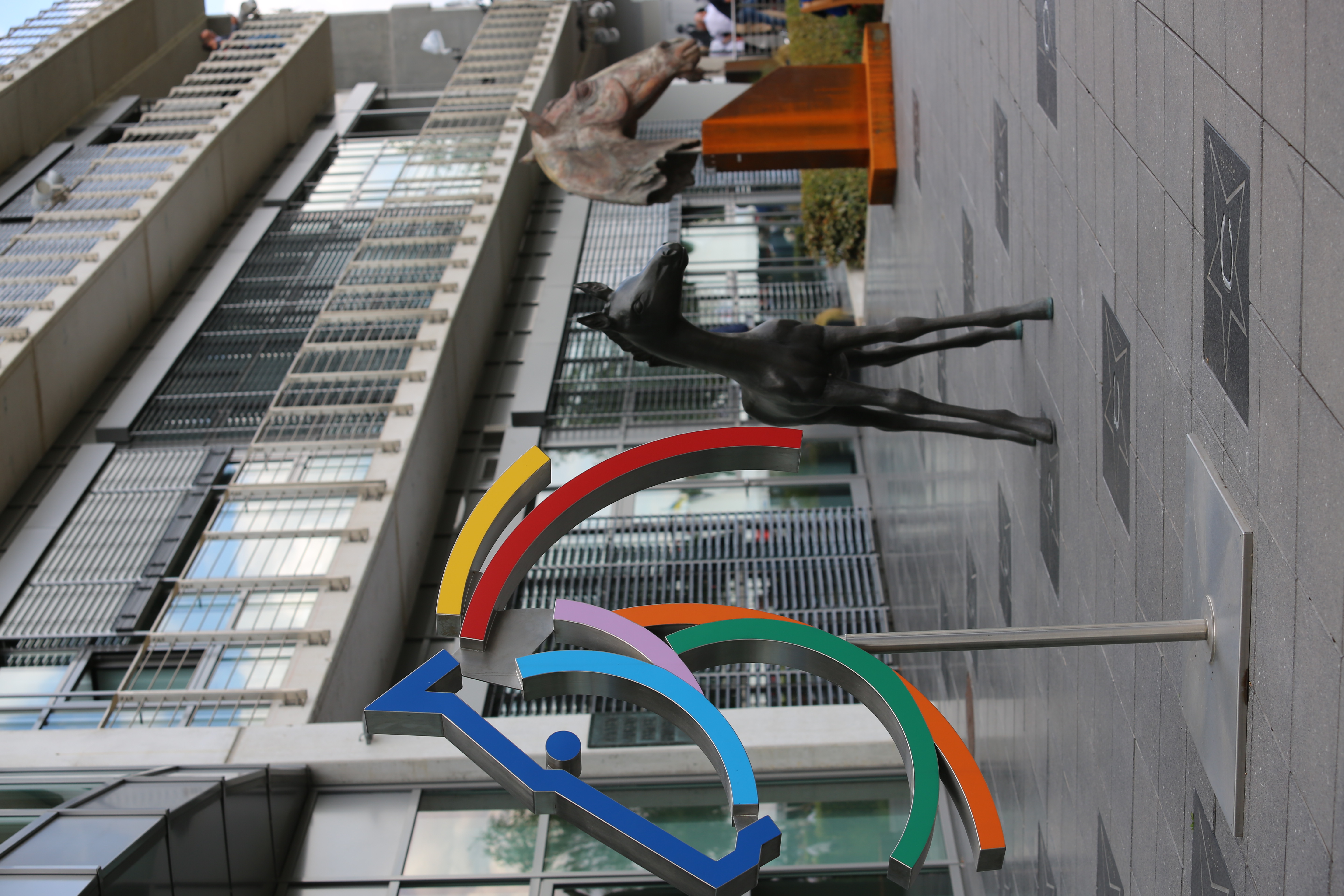
Arriving at Aachen carries the same excitement that I expect football fans feel at the Superbowl or soccer fans at the World Cup. I’ve been to Wimbledon to see the tennis, and the atmosphere at Aachen is every bit as celebratory and exciting for the fans and as focused for the athletes. On Thursday morning, the crowds were relatively sparse, so I was able to browse the trade fair a bit without elbowing my way between vendors. You could buy everything from riding clothes to couture, arena footing and John Deere tractors to fine wine and chocolates. The unicorn trend has hit Germany hard, and I noticed a lot of pink, sparkly things twinkling from several of the peaked white tents.
On Thursday evening, standing in the main stadium for the Nations Cup show jumping, I looked up from the photographer’s pen in the main arena to the packed stadium seats, awed by the number of spectators. Of course, Germany has a strong cheering section and for the German riders the applause thundered. In the jumping, you could tell a rail had fallen by the collective gasp from the crowd. As a photographer, I was filled with awe standing in the middle of this packed stadium. I can only imagine what this experience feels like from the back of a horse.
Dressage Greats
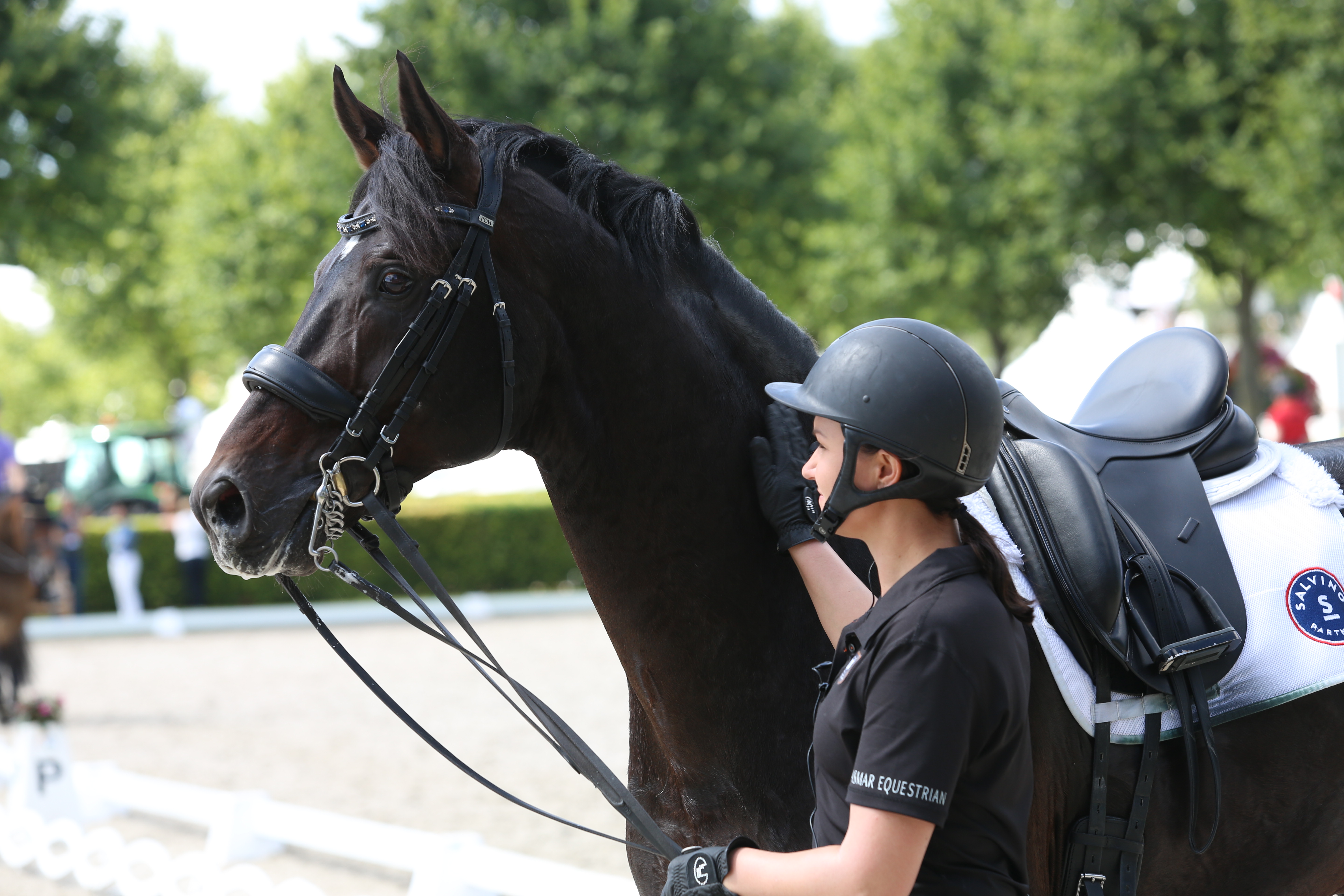
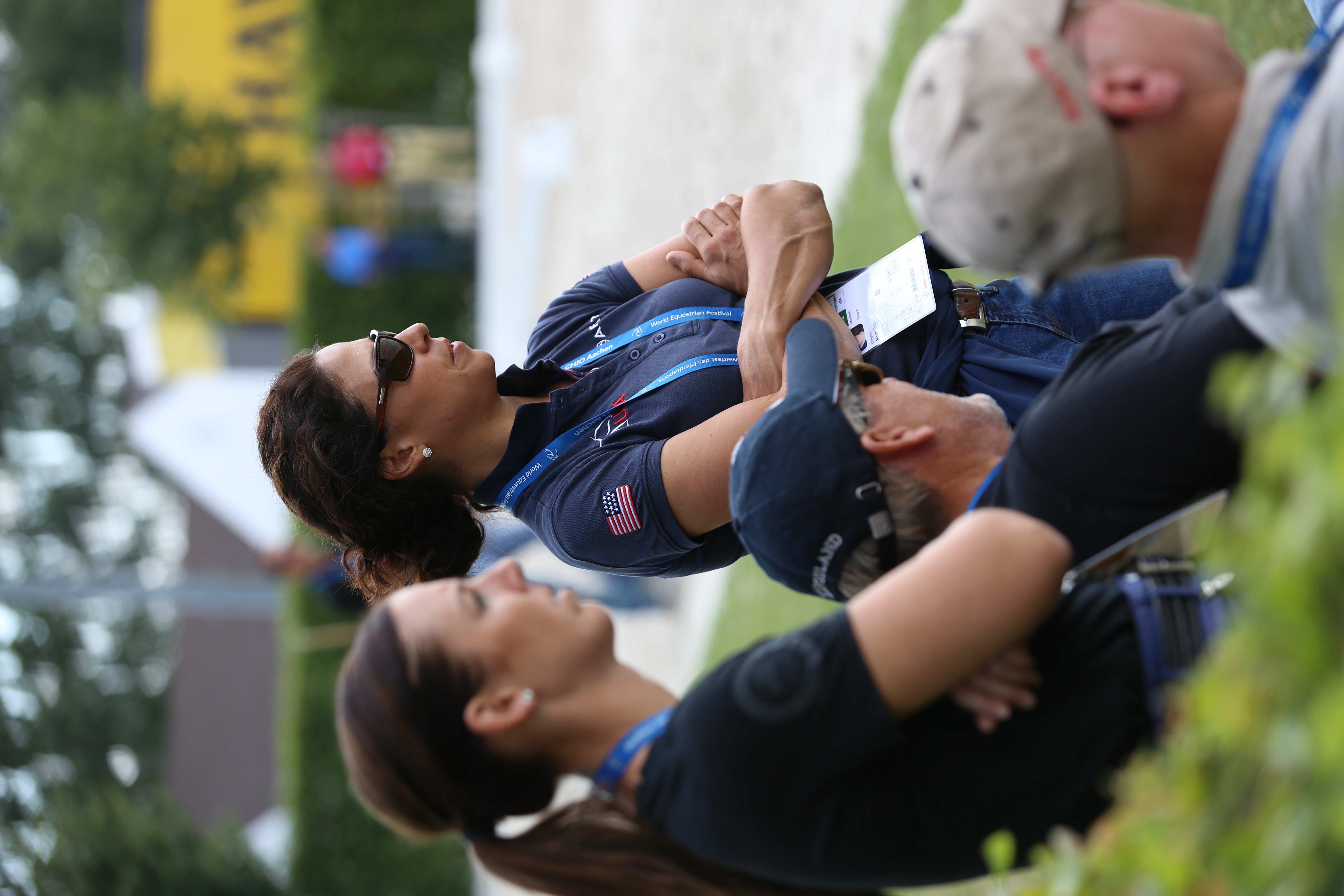
On Friday morning, I wandered over to the dressage warm-up area just outside the Deutsche Bank Stadium, where the dressage competition takes place. The three warm-up arenas are located just outside the stadium and often attract a significant crowd, depending on who is warming up which horse. I was fortunate to see U.S. dressage rider Adrienne Lyle schooling the syndicated stallion Salvino, who is relatively young and green and was excited by the atmosphere. She gave him a quiet, confidence-building school with U.S. dressage coaches Debbie McDonald and Robert Dover watching from the sidelines as they chatted with former German team coach Klaus Balkenhol. After Adrienne led the horse back to the stables, Laura Graves brought Verdades out and schooled him. I was waiting to chat with Robert, who stopped to speak, in German, with Olympian Harry Boldt, who helped Germany earn team gold medals in dressage at the 1964 and 1976 Olympics. Robert and I went to a quiet corner where we could speak about his Aachen experiences.
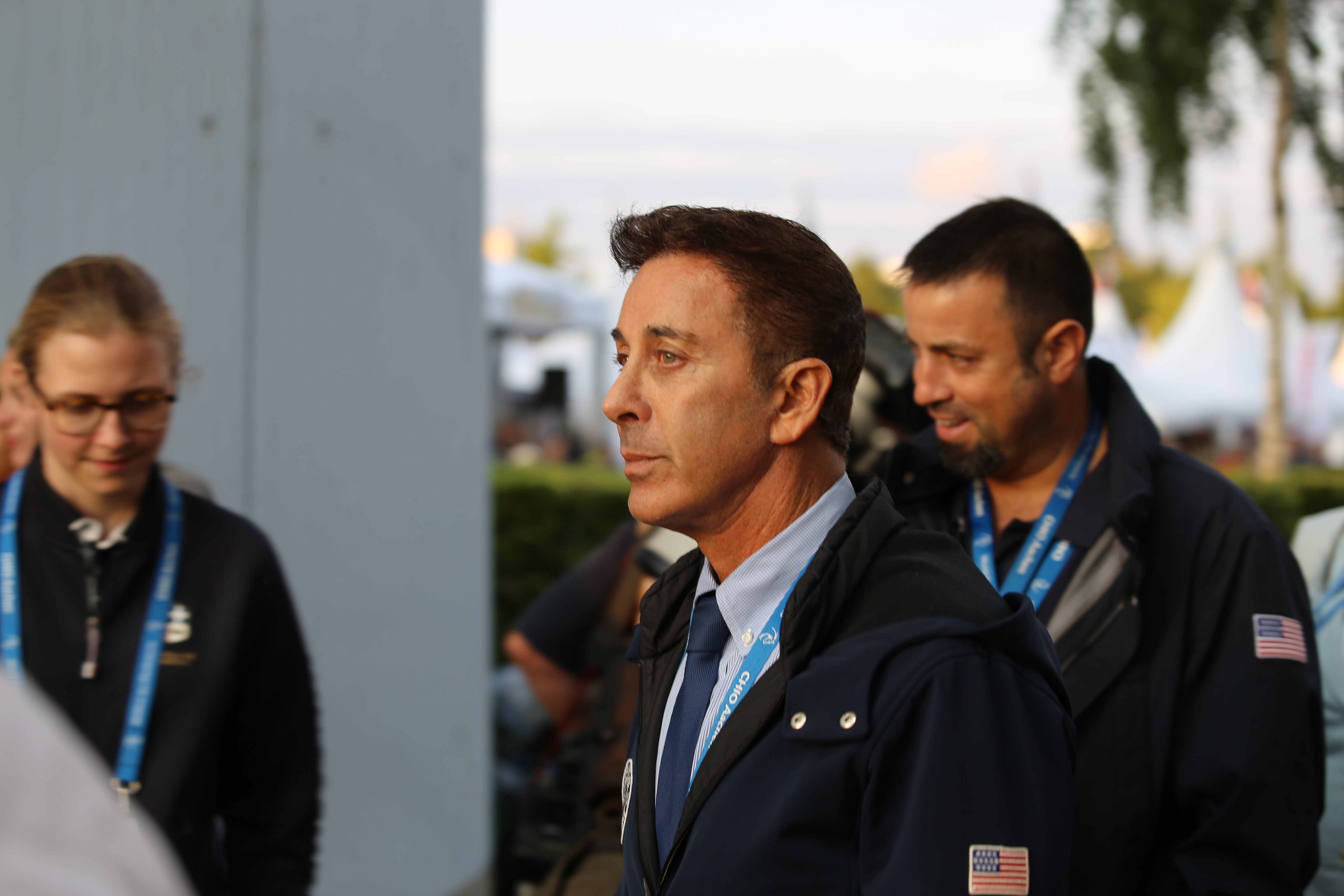
I first interviewed Robert at Aachen in 1999 when I was a young journalist and he was competing for the U.S. at Aachen along with other U.S. Olympians Sue Blinks, Lisa Wilcox and Steffen Peters. At the time, I was young and inexperienced and I remember how grateful I was that the American riders took time out of their busy schedules to chat with me.
Now coaching the U.S. dressage team, Robert loves to talk about dressage and his hopes for the American riders. He also has the perspective of competitor and coach at the CHIO.
“What’s so interesting about Aachen is that it brings our community, like no show in the world, together—where I walk up, and there’s Harry Boldt, one of the greats of our time, and Klaus Balkenhol. Over the years, my chef d’équipe was Jessica Ransehousen. In 1960 Jessica won here in Aachen and went into that stadium where everyone got to watch the American flag go up. Twenty-seven years later, I won and went into that stadium—and that was one of the greatest moments of my career. Twenty-four years later, Steffen won and went in there. So nothing would make me more excited than watching that again.
“It gives me goosebumps still. Being second in the team awards to Germany is great because they have been—through most of my lifetime—the powerhouse in dressage. There was a short time that they were not and they don’t like it at all! This is their sport, so I like when we can give them a ‘horse race’ and show that our training system is very much right on the same place theirs is.”
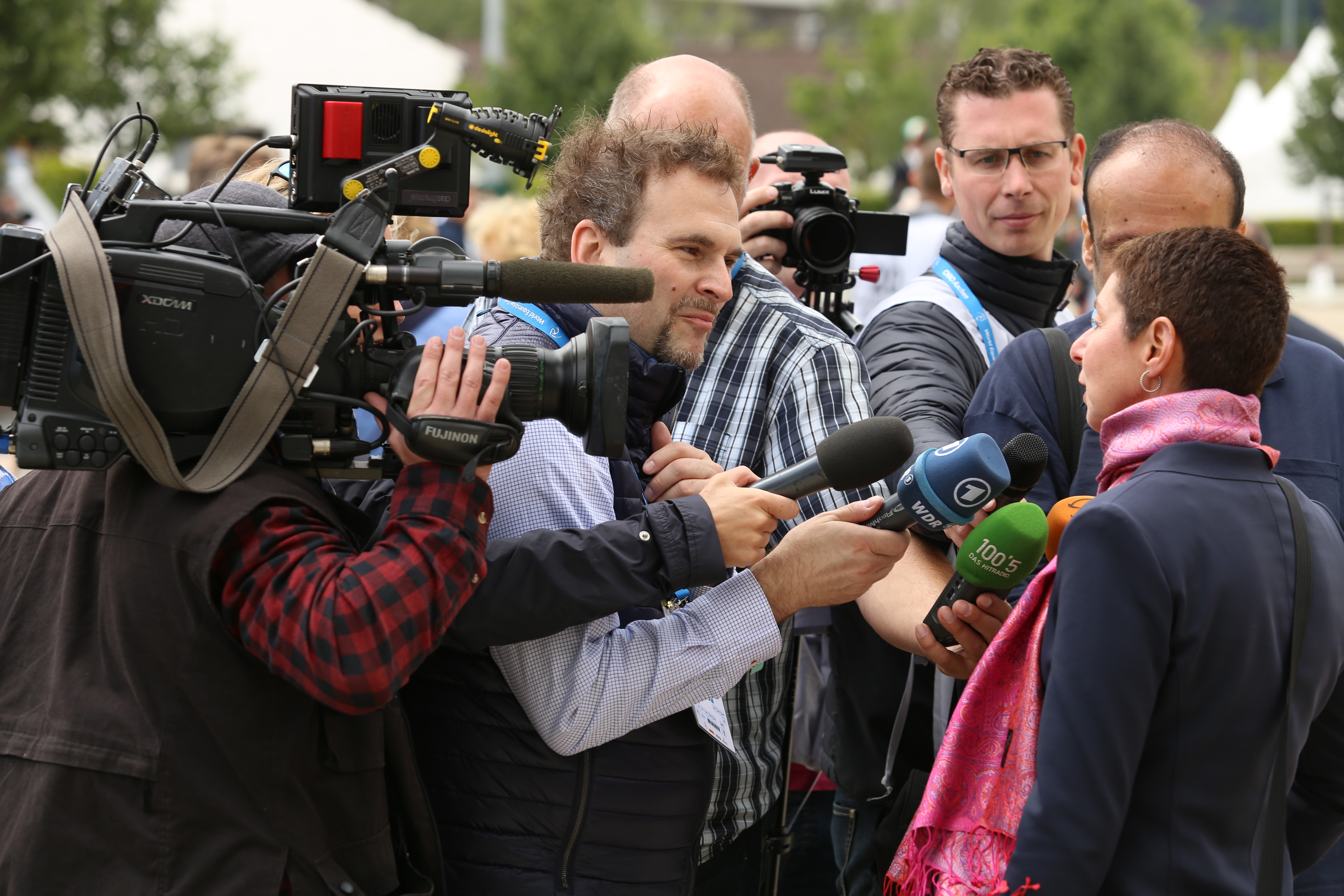
Nightlife
On Friday evening, people were dressed for a party and partaking of the various food offered. Local specialties like sautéed mushrooms with fresh herbs were dished up alongside German standbys including currywurst (bratwurst sausages with curry sauce), pommes frites (French fries, but in Aachen, which is near the borders of Holland and Belgium—countries known for their specialty fries—they’re particularly delicious and served with a large dollop of mayo), and flammkuchen, a flatbread topped with cheese, onions and ham. Rolls were served with any number of fillings, and Liege waffles (a sweet waffle typical of the Belgian city of Liege) were topped with whipped cream and strawberries or Nutella. Stir-fried noodles and fresh salads provided lighter fare. Prices were reasonable and options plentiful.
I grabbed a Radler (a refreshing mix of beer and lemonade) and a small order of pommes and headed to the Deutsche Bank Stadium, where Americans Kathleen Raine and Shelley Francis and Canadian Brittany Fraser-Beaulieu were the first combinations competing in that evening’s musical freestyle competition. While the massive crowds would show up the next day for the showdown between Laura Graves and Isabell Werth, there was a good turnout for the evening class and a number of well-ridden performances.
The Epic Isabell Werth and Laura Graves Showdown
Saturday morning began the dressage Grand Prix Special, and while I had been looking forward to Adrienne’s ride, I couldn’t be two places at once. I opted to catch the cross-country portion of the eventing competition and watch dressage that afternoon when Isabell and Laura would face off in the Grand Prix Special (the two would meet again on Sunday for the Kür).
I resisted the Haribo candy vendor and was able to find time for a quick lunch with my colleagues at the Grand Prix Club, where members of the media are invited to dine alongside riders and coaches, and a hot lunch buffet is served daily. Again, Aachen sets the bar high. At most horse shows and events in the U.S. we’re lucky to find a stale donut and a cup of coffee.
All week, the duel between Isabell and Laura was making headlines. Robert said that he thought Laura could beat Isabell, and the pressure was on. Laura must have had ice water running in her veins to hold up under the pressure. Friday was Isabell’s birthday, and she won the Grand Prix. Saturday was Laura’s birthday, and with a packed stadium, she celebrated with a win in the Grand Prix Special. Isabell would win the freestyle on Sunday, but Saturday belonged to Laura.
Now, I love to watch a good dressage test and I’ve seen quite a few good ones in my years as an equine journalist. But we all know the old jokes about our sport being as exciting as watching paint dry or grass grow. But Laura’s test was accurate, powerful and as smooth as silk. As she and Verdades came down centerline I was standing in the photographer’s area near the gate with tears running down my face, and when I looked around me I saw that I was not alone. When Laura’s scores were announced, the response from the audience was one of the most memorable moments that I’ve experienced watching any equestrian sport.
Laura was clearly thrilled with the result. She said, “He was just unbelievable. You know, we hadn’t had him in the Special at all this year. Our priority was the World Cup in Omaha, and he was phenomenal there but really no Special yet. Our warm-up today was a little tricky because he kept thinking of the Grand Prix and the changes come off the other lead in this test. I knew as soon as we got in the arena though, he said, ‘OK, mom, it’s the Special,’ and I could just kind of sit back and enjoy the ride. He’s incredible and it’s such an honor to be invited to compete at Aachen at all. The best competition in the world is here, for sure.
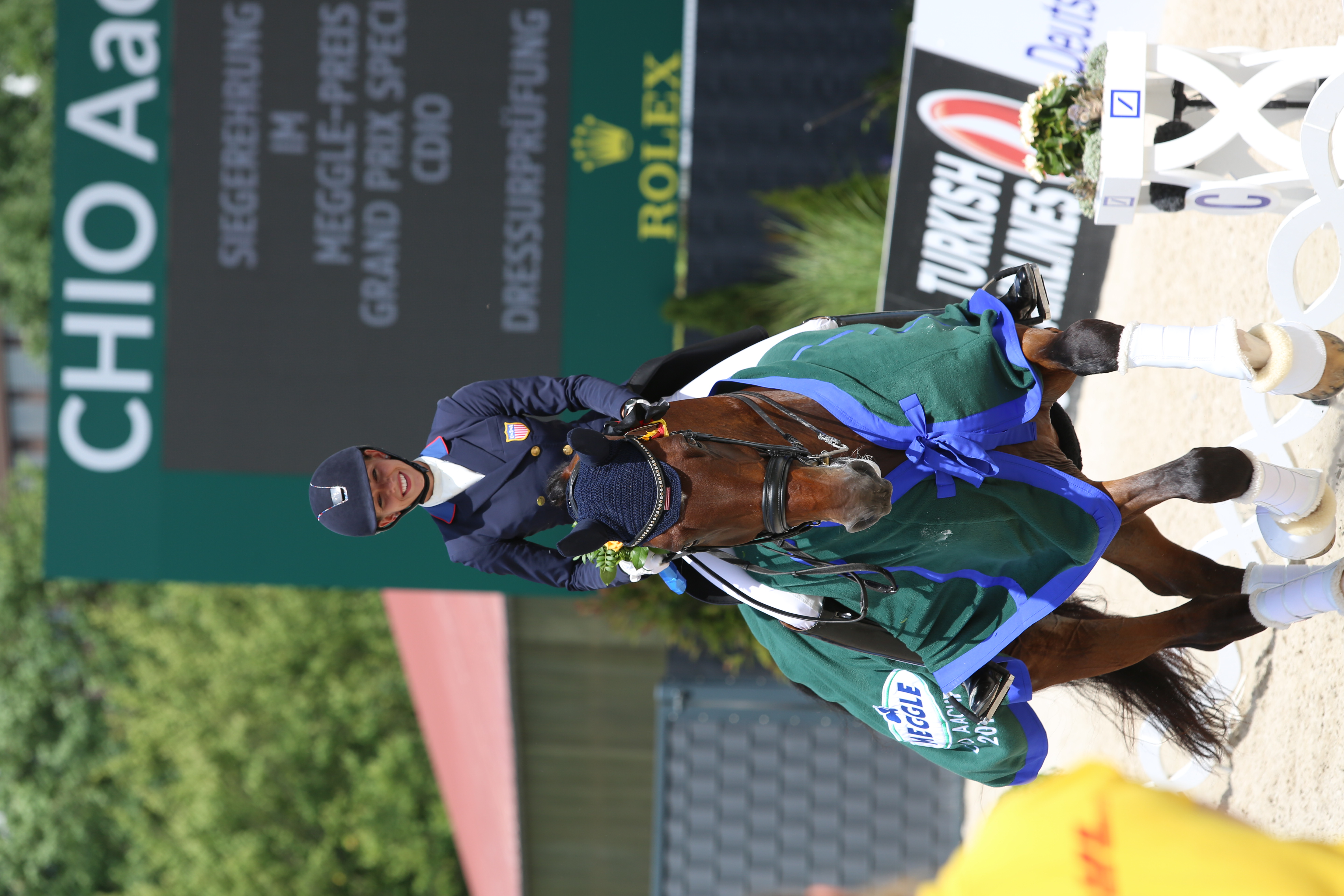
“I’ve been to the Olympics, but this is so different because all the sports are so close together. I can’t walk and see eventing, for example, when I’m at a WEG or Olympics. This is an incredible opportunity and it’s not just our little pocket of dressage riders. It’s real equestrian sport and it’s appreciated over here like a sport. People come here and spend the whole day. They watch dressage in the morning and show jumping in the evening and it’s a lifestyle. That’s something I hope we can bring over to the States. It’s such an educated crowd in every way. Whether it’s dressage or show jumping or eventing, they know their stuff.”
Regarding her “rivalry” with Isabell, Laura said, “There’s no pressure. It’s a goal. I want to be No. 1 in the world and it’s not so much about Isabell. Whether she is No. 1 in the world right now, she is undoubtedly one of the top riders in the world. To beat her is not necessarily a personal thing, but it’s a measure of my own training. And that’s what’s really special to me about winning today.”
Aachen City
I am lucky to have friends in Aachen whom I stayed with during the competition (I looked online, and clearly hotel vendors have caught on to the fact that they can charge a premium during the CHIO). Working morning until night doesn’t leave a lot of time for socializing, and since I hadn’t seen my friend in more than a decade, I skipped the show jumping on Saturday evening to spend some time with her. But as I was heading from the shuttle bus to my car, the trade fair and food vending areas were transforming into a party zone. The vendors were doing a hopping business, and well-dressed patrons were filling the beer and champagne tents rapidly. Clearly, the CHIO is the place to be on this particular Saturday night.
While the city of Aachen is rather sprawling and some of the post-war construction is not particularly beautiful (the area near the Soers boasts a number of big-box-type shopping centers), the winding streets and old buildings in the city center are a charming place to spend an evening. Local shops decorate their windows with equestrian themes during the CHIO and it feels like the whole city is celebrating the horse.
While shops close around 6 p.m. in Germany, there was a bustling bar and restaurant scene in the city center. I enjoyed a dish of rich vanilla ice cream with sweet, fresh strawberries and a glass of prosecco at an outdoor café as we watched people come and go. Aachen is home to a large university and the numerous students bring a vibrant culture to the city. It was here that Charlemagne established his palace at the heart of the Carolingian Empire during Roman times, and the enormous cathedral is testament to his influence here. The imposing city hall towers over the town plaza, but a drunken bachelors’ party brought a 21st-century mood to the ancient backdrop.
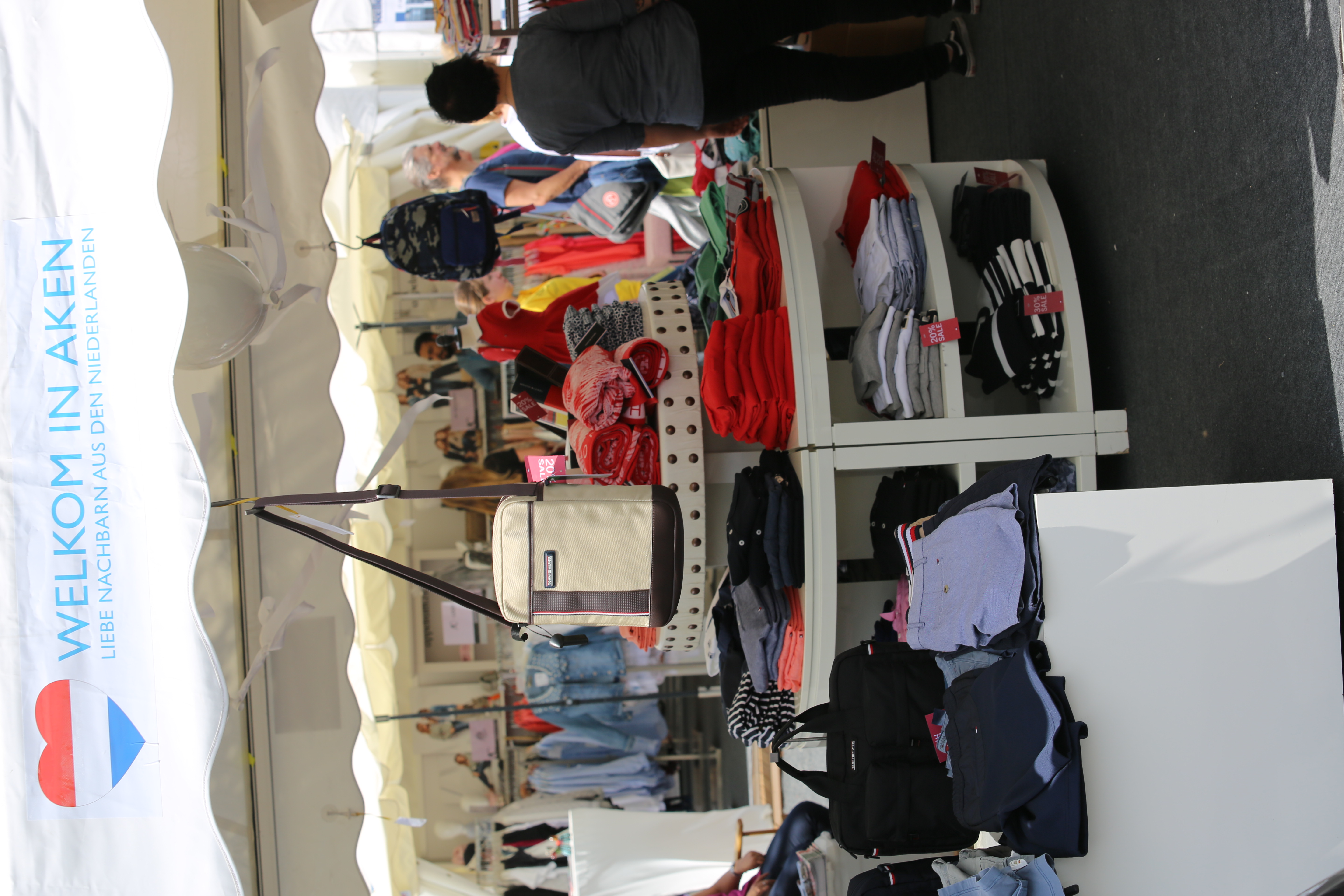
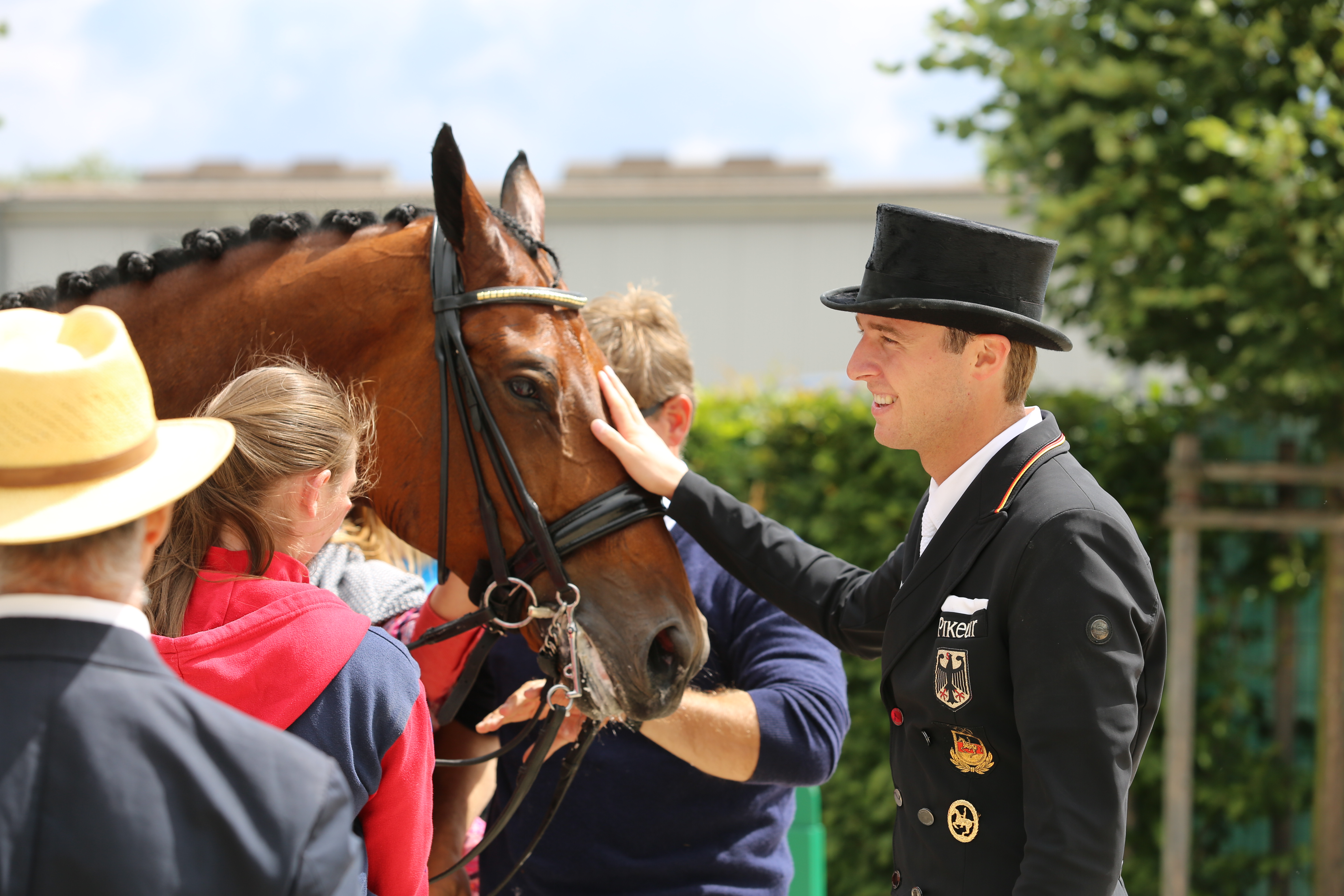
The Queen of Aachen
On Sunday morning, Isabell reclaimed her title as the Queen of Aachen when she and Weihegold OLD won the musical freestyle. Her face was a mask of utter concentration as she rode a nearly flawless test that had the once-again filled stadium on its feet. The rising star of German dressage, Sönke Rothenberger, 22, and his big bay, Cosmo, had a beautiful, fluid test to finish second. Laura had a couple of mistakes and finished third in her final test of the CHIO.
As the freestyle wrapped up, I caught up with Adrienne. She said, “I think we have the most amazing team. Everyone is friends and everyone is so supportive of each other that it’s much more stressful to watch everyone else ride. We’re all on the edge of our seat, and what an amazing finish for the U.S. with Laura’s win. It’s been a long time since we heard our national anthem played here!”
Adrienne has been riding with Debbie for 12 years. She has been taking her time with her young stallion, Salvino, and said that he has been getting better and better through the summer spent training and competing in Europe. “Just getting to spend time watching everyone’s training here really elevates the program,” she said. The U.S. team was based in Belgium for the summer.
“Aachen is like no other show on earth,” she said. “I came back this year and was even more excited. The first time I competed here with Wizard, in 2014, I was just running around like, ‘You’ve got to see this! You’ve got to see that!’ It’s so incredibly well run and the crowds are so incredibly well educated that we always laugh and say, ‘Wait until you get your first mistake in a test at Aachen,’ because the collective gasp from the crowd is so loud. You’d think someone fell off, it’s so loud if someone misses a flying change! But it’s so fabulous having a sold-out stadium of fans who are so educated and that into every single step of your ride. It’s hard to create that anywhere else, it’s an amazing show.”
Debbie said that coaching the women riding for the U.S. has been a joy since she retired from competitive riding. She also said that it’s just as satisfying watching her students compete as it was riding down centerline. “I always get emotional when I’m coaching. It’s a full-time job and I’m loving every moment.”
A Farewell Like No Other
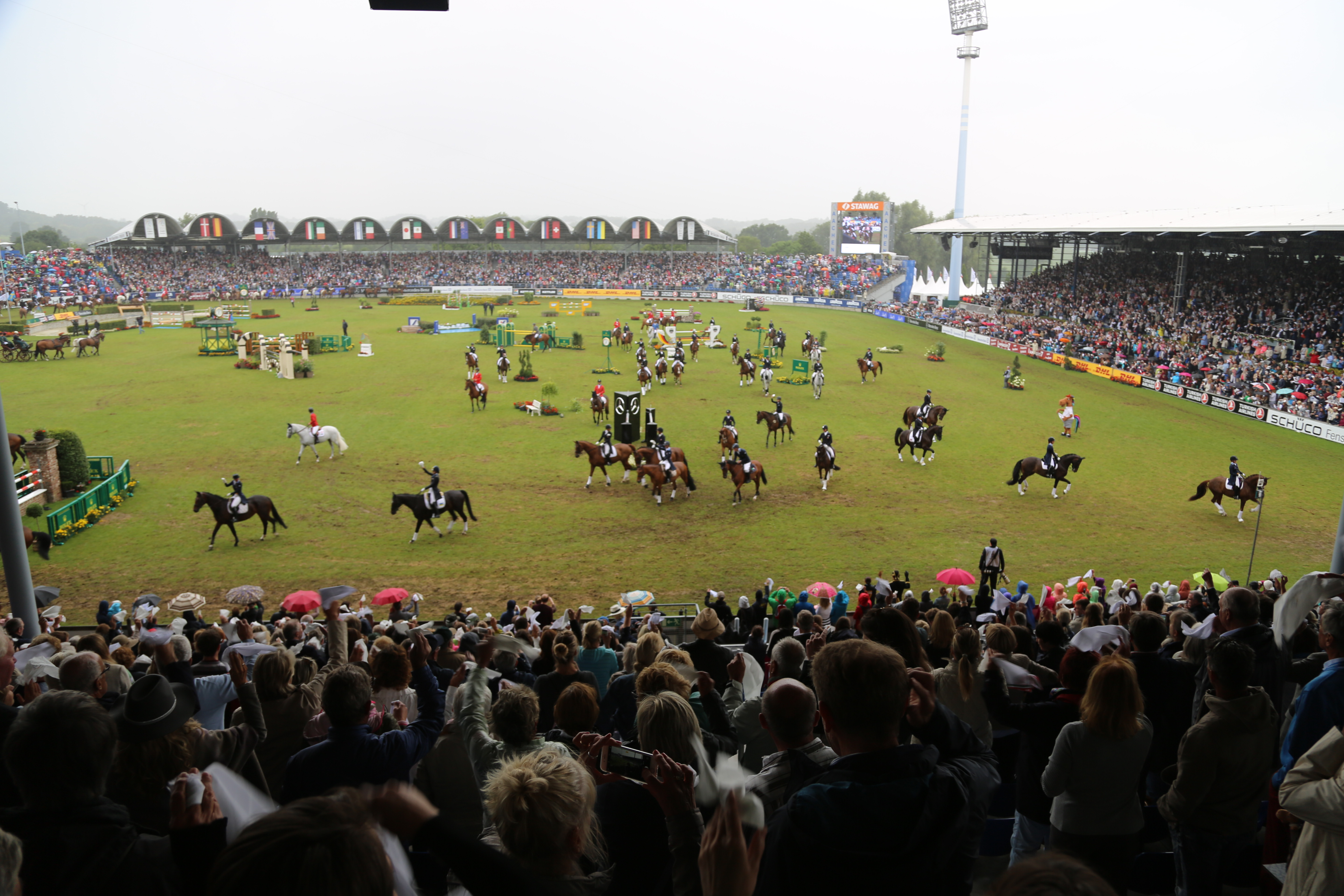
While the previous days had been warm and sunny, Sunday morning was distinctly chilly. I had left my jacket in the rental car parked a shuttle ride away, and after an hour in the cold I admitted that I needed to fork over some cash in the trade fair for something warm to wear. I headed to Princess and Queens, a fashionable clothing store, where I was quickly outfitted with a soft and stylish sweatshirt and scarf that kept me comfortable for the rest of the day and also serves as a fun reminder of the weekend.
That afternoon the show jumping Grand Prix took place in the main stadium, which was absolutely packed to capacity. As storm clouds threatened dramatically, horses and riders tackled the massive course with incredible athleticism and bravery. Only four combinations made it to the jump-off, including American Laura Kraut. Unfortunately, she and Zeremonie had two rails down. Victory went to Belgian rider Gregory Wathelet and the gorgeous gray mare Coree, who flew around the jump-off course to stop the big Rolex clock in 46.6 seconds.
Coree was impatient during the awards ceremony, and her groom stood by as she was presented with the Rolex prize. The sky had been threatening rain throughout the ceremony and during the victory gallop the heavens opened and a heavy rain began to fall. It had held off all day.
The Farewell of Nations is a closing ceremony like no other. All of the participants, both human and equine, gather in the main stadium to take part in the grand finale. As horses and riders circle the stadium, participants and spectators take part in a delightful tradition in which they wave white handkerchiefs to thank the horses and bid one another farewell to the sound of the German folk song “Muss i denn zum Städele hinaus.” More than a few of these handkerchiefs dry tears shed at the emotional end of this elaborate celebration of equestrian sport.
After I packed up my laptop and camera, I walked to the shuttle-bus stop located behind the stabling. A large horse van was just pulling out of the stables, and the traffic police, dressed in their day-glow vests, waved white handkerchiefs at the vehicle as it drove away. Another year at Aachen come to an end.



